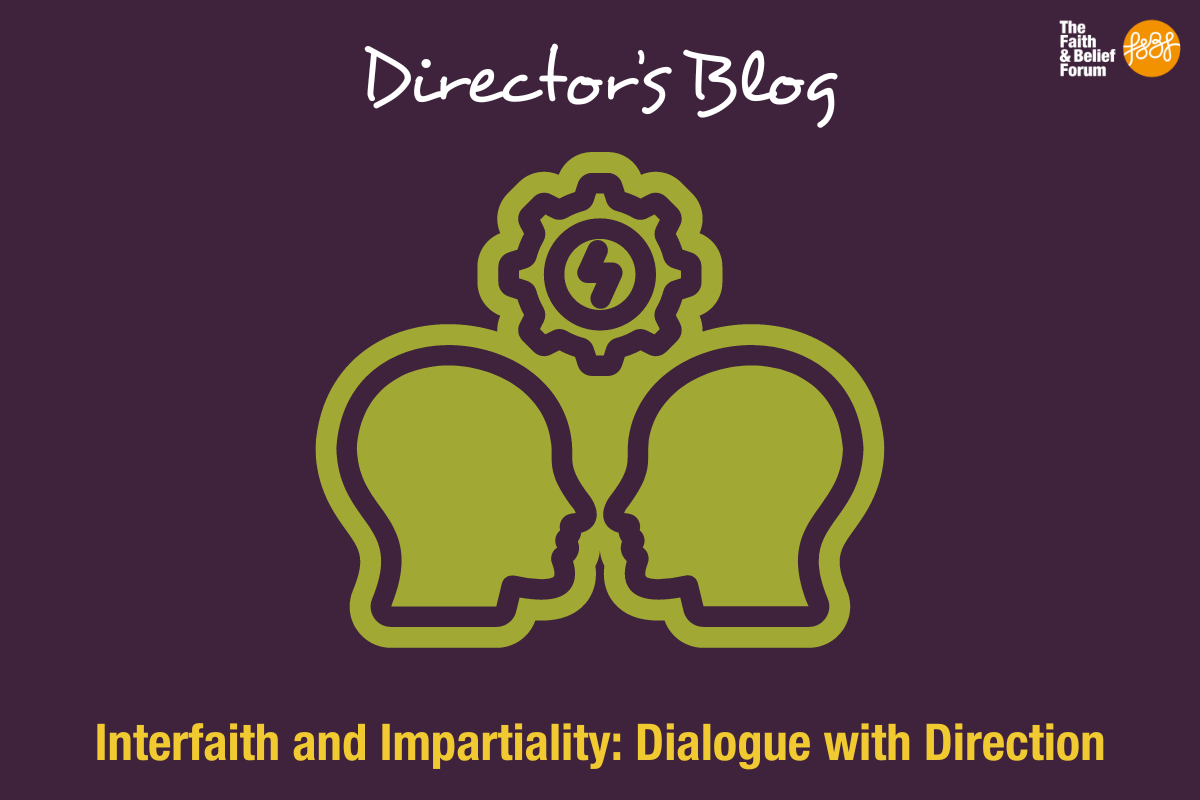
Challenging Faith Based Hate: True Stories
16 / 02 / 24
Menu

31 / 07 / 20

By Phil Champain, Director of the Faith & Belief Forum
I started writing haikus during lockdown. Looking back at them after four months it is interesting to pick out themes – of bravery, entrapment, drought, and finally some delicate and cautious movement.
Birds and unseen cage
Windows framing dappled shade
Hopeful, eyes ahead.
It has been hard to remain hopeful from the confines of our various ‘cages’. Though we have tried hard to look ahead, the path remains somewhat foggy and feels perilous. These are unsettling times. Harsh, painful, and traumatic for many. As we approach the summer holiday season and take sight of a new academic year this seems a good time to take stock. Here are three things I have observed over the past four months and which have a direct bearing on our work.
Faith organisations have been very much to the fore during the pandemic, providing critical support and services to those most in need. The release of our report Social Cohesion: Faith and Belief, produced in collaboration with the British Academy and Theos, has been timely. The report addresses the question ‘why are faith groups not seen more as an asset for social cohesion policy?’
At a time when faith groups and organisations are making such a positive contribution to managing the pandemic, the report shines a strong light on this question, exploring why faith groups are more often than not seen as a problem to be managed rather than an asset to be harnessed by policy makers. The answer lies in the way faith has been associated with crisis, notably the race riots in the north of England in 2001, 9/11, the 7/7 London bombings and ongoing security concerns. This, the report argues, points to the importance of building on current efforts to separate cohesion and security, something vital for ‘encouraging a much broader consideration of the faith and belief sector’.
The irony here is that another crisis, this time a pandemic, has been the catalyst for telling stories about faith. Though many of these current stories are positive ones, there is a need to develop cohesion policy that is rooted in what the report refers to as the ‘structural and socioeconomic dynamics underlying all human activity.’ As we begin to understand the full impact of the pandemic, making the connection between interfaith, social cohesion and community development will become more important in the face of economic hardship and continued deficits in social care.
The pandemic has led to a dramatic change in the way we interact. Perhaps the most significant impact has been on education. Globally more than 1.2 billion children are out of the classroom. Although schools are reopening in the UK, ongoing concerns about a second wave together with a shift towards e-learning suggest that hybrid models of learning which embrace an online element are likely to develop further.
In his book, 21 Lessons for the 21st Century, scholar Yuval Noah Harari outlines how schools continue to focus on traditional academic skills and rote learning, rather than on skills such as critical thinking and adaptability, which will be more important for success in the future. Could the move to online learning be the catalyst to create a new, more effective method of educating students? There are serious considerations here for the work we do at F&BF, much of it rooted in face to face encounter and partnerships with schools and universities.
We will need to monitor how the education sector responds and adapt accordingly. It seems likely that online forms of communication will become more established and commonplace, whilst face to face encounter will be more difficult to organise but equally, and perhaps consequently, more valuable and sought after. The update on our education and learning programmes will give a flavour of how we are starting to adapt to the online space
The conversation is starting about what happens when we come out of the pandemic. There is an opportunity to create a fairer, more just, and sustainable future. Interestingly, some are using the framework of the United Nation’s (UN’s) Sustainable Development Goals (SDGs) – to argue that the Prime Minister’s plan to ‘build, build, build’ is reframed as ‘build back better’.
Indeed, the UN is no stranger to reviewing the UK’s record when it comes to some of the SDGs, with the UN Special Rapporteur on Poverty pointing out, when asked about the UK, that the worst aspects of past austerity won’t be undone by unprecedented government spending now. ‘The damage caused to community cohesion and to the social infrastructure are likely to prove permanent’ he surmised back in April. The opportunity now is to forge new partnerships to ‘build back better’.
At F&BF we are committed to harnessing our social action and youth leadership programmes to this challenge and to opening fresh conversations with local and central government about how to develop such partnerships and processes in ways that are inclusive of minority faith and belief voices.
As we reflect on the past months and look ahead, it is important to remain hopeful. We need to continue to find the space to talk about how we best adapt and respond to the impacts of the pandemic. This is important for social cohesion, for education, and for the process of recovery. There is much we can learn from each other. At F&BF we are constantly working to improve what we can offer to strengthen relations between people of different faiths and beliefs at a time when collaboration is more important than ever and the role of faith and belief groups so significant.
Droplets on cracked leaves
Clouds gather excitedly
Rain breaks on parched earth

16 / 02 / 24

15 / 02 / 24

16 / 01 / 24